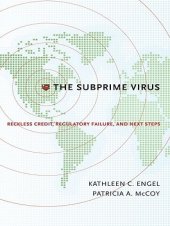
The Subprime Virus:
Reckless Credit, Regulatory Failure and Next Steps
by Kathleen Engel and Patricia McCoy
About a month ago, I had the privilege of testifying before a House Financial Services Subcommittee about the impact of new mortgage regulations on "Homeowners and Businesses." In entering the committee room and later listening to my fellow panelists (two for consumers, eight for industry), I had this terrible feeling that I had entered a new dimension, where memories had been wiped clean and responsibility and accountability were words that had no meaning or place. I sat and listened as the very same people who for years defended the indefensible banking industry's insatiable greed that led to our nation's economic collapse, complain bitterly about the state of the housing and mortgage markets and how government regulation was stifling their ability to grow (and of course, create jobs!). Beyond displaying my utter dismay that many members of Congress were giving these folks a level of respect and credibility they completely did not deserve, I really had no idea how to respond. Looking back, what I should have done to help them cure their collective amnesia was hand them Kathleen Engel and Patricia McCoy's new book, The Subprime Virus.
In The Subprime Virus, Ms. Engel and Ms. McCoy (who I should note, I have known and worked with for many years), in a strong and clear narrative voice, take us back to the beginning, to the early 1990s, when predatory lending became a household word to those of us working for consumers in our nation's poorest communities. They walk us through the growth of securitization and do a supreme job of explaining the alphabet soup of Wall Street lawyerly constructs (CDOs, SIVs, CDSs) that created the opaque and unregulated legalized gambling system that served to spread predatory lending from Chicago's South Side and West Virginia's back hills to the main streets of middle class America.
But beyond compellingly recounting this history, The Subprime Virus wonderfully explains how bank greed and government blindness and complicity led to the mortgage market collapse. Anyone reading this book, will walk away not only fully understanding the mortgage industry's destructive behavior but also should be completely outraged at the OCC's cynical efforts to grab power and protect banks, and the Federal Reserve's ideologically driven inattention to consumer protection.
Finally, for those of us interested in actually learning from history, The Subprime Virus offers a clear analysis of what we'll need to do to rebuild a safe and just housing and mortgage marketplace. And for those us who simply want to hold our friends in the banking industry and in government accountable for their failures and never let them forget their responsibility for our current economic crisis, The Subprime Virus is not only a must read, but a great present. I may just need to leave a few copies behind next time I'm visiting Congress.

 RSS Feed
RSS Feed
